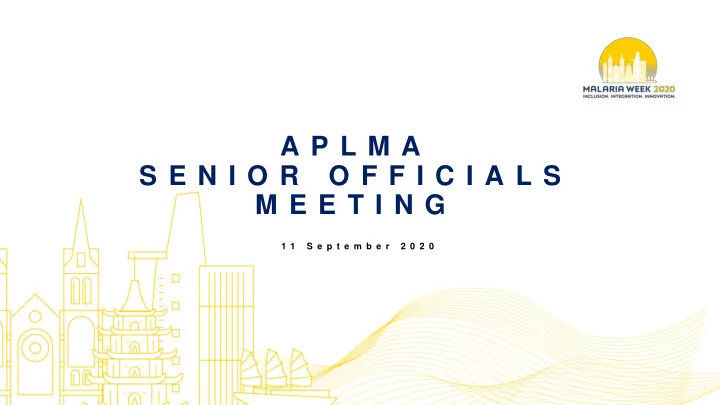

A P L M A S E N I O R O F F I C I A L S M E E T I N G 1 1 S e p t e m b e r 2 0 2 0
Mechanics of the Meeting ▪ Please put your microphones and videos on mute ▪ All parts of the SOM will be recorded ▪ Active participation in the breakouts is requested ▪ Senior officials who have not yet communicated their preferred breakout rooms please write your preference in the chatbox (a) Surveillance (b) Financing (c) Innovation
Outlook for Today Session 1 : Welcome and Opening Session 2 : Review of Progress Session 3 : Sustaining Momentum on the Path to Elimination Session 4 : Identifying actionable solutions to key challenges Breakout Groups ▪ Breakout 4A: Strong Surveillance Systems and Timely Reporting ▪ Breakout 4B: Sustaining Health Financing in a Time of Crisis ▪ Breakout 4C: Harnessing Innovation to Accelerate Malaria Elimination and Strengthen Health Security Session 5 : Developing a call for action
Welcome and Opening
Welcome from Viet Nam PROF TRAN TRANH DUONG Director, National Institute of Malariology, Parasitology and Entomology (NIMPE) Viet Nam
Welcome from WHO DR PEDRO ALONSO Director, Global Malaria Programme World Health Organization
Welcome from APLMA PROF TIKKI PANGETSU Chair, Board of Directors Asia Pacific Leaders Malaria Alliance (APLMA)
APLMA SOM Co-Chairs Co-Chair Co-Chair Prof Tran Thanh Duong Prof Tikki Pangestu Director, NIMPE Chair, APLMA Board of Directors Viet Nam
Session 2: Review and Progress Chair: Prof Tran Thanh Duong Director, NIMPE, Viet Nam
Five-Year Regional Progress Report DR ROSE NANI MUDIN Head of Vector Borne Disease Sector in the Disease Control Division Ministry of Health Malaysia ❖ Consultant Public Health Physician, Ministry of Health Malaysia ❖ Over 20 years’ experience related as program manager and managing infectious diseases and Vector Borne Diseases ❖ Responsible for planning, monitoring and evaluation of the Vector Borne Disease program, including the planning of resources such as the manpower, equipment, chemical and financial support.
Five-Year Regional Progress Report 1. Unite national efforts and regional action 2. Map, prevent, 6.Innovate to test and treat eliminate the disease, everywhere APLMA Leaders’ Roadmap Priorities 3. Ensure 5. Mobilize domestic access to high financing and quality malaria leverage services and external support commodities 4. Improve targeting and efficiency to maximize impact
Priorities for Accelerating Elimination Community-based approaches Private sector engagement ❖ Integrated health service delivery ❖ Develop private provider engagement plans at national and sub-national (including malaria) to and in partnership level with communities ❖ Integrated surveillance systems for ❖ Multi-sectoral platforms to coordinate public, private and civil society data response in hard-to-reach areas ❖ Improve quality of care of private ❖ Documentation of best practices and providers through training and practical tools to strengthen capacities mentoring and information sharing
Priorities for Accelerating Elimination Vector Control & Surveillance Vivax ❖ Appropriate vector control tools to ❖ Community engagement to inform patients address last mile challenges (outdoor and providers about the risks and benefits of biting) radical cure ❖ Operational research to assess feasibility of radical cure options ❖ Build entomology capacity at national ❖ Better understanding of optimal combinations and sub-national levels of vector control and radical cure interventions ❖ Strengthen vector surveillance systems ❖ Clear policy pathways for accelerated access by involving communities to novel tools for radical cure (focus on inter- agency collaboration)
APLMA Leaders’ Dashboard 2019 DR NGO DUC THANG Chief of Epidemiology Department, National Institute of Malariology, Parasitology and Entomology (NIMPE) Viet Nam ❖ Received MD degree from Hanoi Medical University and a PhD from Prince Leopold Institute of Tropical Medicine in Belgium ❖ Research interests: strengthening surveillance, stratification, program review, malaria elimination models, and evaluating the effectiveness of insecticide treated hammocks
APLMA Leaders’ Dashboard 2019 Policy milestones
Session 3 Moderator DR SARTHAK DAS Chief Operating Officer, APLMA
Session 3: Sustaining Momentum on the Path to Elimination Moderated by Dr Sarthak Das CEO, APLMA
Ensuring Health for All MR GAURAV GOGOI Member of Parliament Founding Member, India Parliamentarians for Malaria Elimination Group
Strengthening Health Systems to Enhance Response DR HUY REKOL Director, National Center for Parasitology, Entomology and Malaria Control (CNM) Cambodia
Global Lessons, Regional Solutions PROF DYANN WIRTH Richard Pearson Strong Professor of Infectious Diseases, Harvard T.H. Chan School of Public Health Chair, WHO Malaria Policy Advisory Committee
Catalyzing Sustainable Financing for Elimination DR URBAN WEBER Head of High Impact Asia The Global Fund
Elimination in a Time of Pandemic Response DR KENNETH STALEY U.S. Global Malaria, President’s Malaria Initiative Lead, USAID COVID-19 Task Force
B r e a k o u t s e s s i o n s A P L M A S E N I O R O F F I C I A L S M E E T I N G
Breakout Session Links ❖ 4A. Surveillance: https://youtu.be/H9seRKu_LAk ❖ 4B: Financing: https://youtu.be/Iivym2zDwNM ❖ 4C: Innovation: https://youtu.be/UXatBCTlpYo
Session 5: Developing a Call for Action Chaired by Prof Tikki Pangestu Chair, APLMA Board of Directors
Messages from Surveillance Breakout ❖ 1 ❖ 2 ❖ 3
Messages from Financing Breakout ❖ 1 ❖ 2 ❖ 3
Messages from Innovation Breakout ❖ 1. We need to ensure that key populations have timely access to malaria tools to effectively prevent, track, test, treat every case everywhere including tools for the radical cure of P. vivax malaria ❖ 2. We should collaborate across agencies to support improved access to existing and new malaria tools .
M A L A R I A W E E K I N C L U S I O N . I N T E G R A T I O N . I N N O V A T I O N
Recommend
More recommend